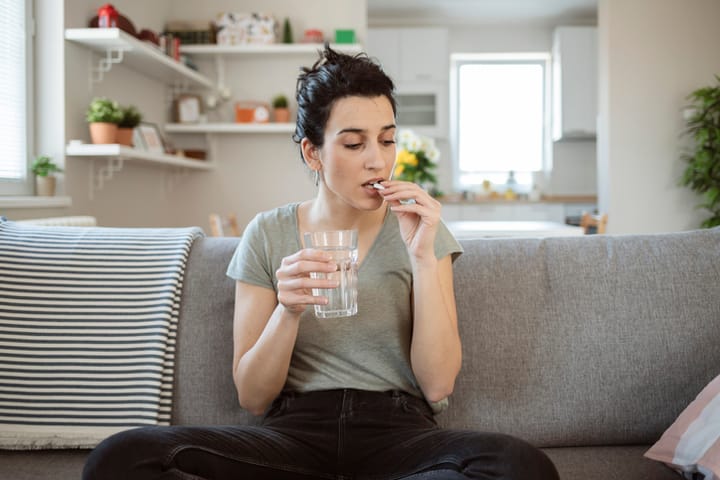One of the biggest deciding factors when it comes to choosing birth control is whether you can still ovulate on it. You might prefer an option that does not interfere with your hormones, or maybe you’re fearful that the prospect of ovulation could mean an increased chance of pregnancy. Here’s everything you need to know about can you ovulate on birth control:
- You will ovulate using non-hormonal birth control. A copper IUD does not impact your hormones. You will continue a regular menstrual cycle. There is a chance you will continue to ovulate on a hormonal IUD.
- You are unlikely to ovulate with a birth control implant. The birth control implant releases a steady dose of progestin. It will usually prevent ovulation, but this may not always be the case every single month. This hormone will also thicken the mucus in the cervix and the uterus to prevent implantation.
- You cannot ovulate on the combination pill. The combination pill, also known as the combined oral contraceptive pill, is made up of two hormones; estrogen and progestin. If you take this pill correctly, it should prevent you from ovulating altogether. This is why the period you get during the gap week of the pill packet is considered a “fake” period, as the uterus is not shedding an egg. That said, it sure does feel real.
- You might ovulate on the mini pill. The mini-pill only contains one hormone; progestin. Although the mini pill prevents ovulation, it is not as effective as the combination pill is at it. So, approximately four in ten of those taking the mini pill will still ovulate.
- Take birth control pills correctly. Birth control pills are the most effective if you take them at the same time every day and do not miss days. Honestly, I struggle with taking it on time or even taking it at all; so my advice is to put the pill packet somewhere visible so you will see it every morning to remind you. You can also set an alarm on your phone every day.
- If you throw up, it’s a missed pill. Many people prefer to take birth control in the evening, but if you’re going out for a few drinks and then later throw up, your body may not have metabolized the pill yet. This counts as a missed pill. So, if you throw up on the same day, you took the birth control pill, be sure to use an extra method of contraception to stay on the safe side.
More about birth control and ovulation
- Tell your doctor about your medications. Some medications interfere with how effective birth control is. So, you will need to be transparent with your doctor about what other pills you are on. Being put on new medications can also interfere with birth control, so if, for example, you’re getting antibiotics because you’re under the weather, ask your doctor or pharmacist for advice.
- Be careful with what you eat. You do not need to make any drastic changes to your diet if you’re on birth control. The main thing to watch out for is grapefruit. You might have already heard that grapefruit can potentially interfere with lots of medications. When it comes to birth control, it may increase the amount of estrogen in your body. This might not make birth control less effective at preventing pregnancy, but there is a risk of it increasing the likelihood of developing blood clots or breast cancer.
- Skip the activated charcoal on the pill. If you love the activated charcoal trend, do not take any of these foods or drinks with your birth control. People drink activated charcoal water because they believe it absorbs toxins from the body, but activated charcoal cannot tell the difference between “toxins” and much-needed medications. So, if you don’t want to part ways with activated charcoal water, wait at least a few hours before or after taking birth control.
- How to tell if you ovulated. Not everyone who has ovulated can actually tell that they have. Most women don’t notice symptoms, but some do, especially if they pay close attention to their cycles. Ovulation symptoms include nausea, cramping, a change in normal discharge, breast tenderness, mood changes, headaches, and heightened senses such as smell. Keep in mind that there isn’t a way to prove you definitely ovulated if you suspect something may have interfered with your hormonal birth control. If you’re thinking about it a lot, your mind might trick you into feeling like you did. Another giveaway that you night have ovulated is that it’s the right time in your cycle. The first day of your period is the first day of your menstrual cycle. Ovulation usually occurs around halfway through, so on average, day 14. Remember, not everyone’s cycle is actually the same every month; we do not all ovulate on day 14 like clockwork, nor is everyone’s cycle exactly 28 days long.
- What happens if you ovulate? The mini pill and the combination birth control pill work in more than one way: to prevent ovulation and stop sperm from reaching the egg if you did ovulate. The combination pill and implant may also prevent a fertilized egg from sticking to the uterus lining. At the same time, an IUD prevents sperm from getting to an egg. Do not take this as a sign that you should not have to worry about pregnancy if you suspect you ovulated on birth control. No method of birth control is 100% effective, so you should still be careful if you think you have ovulated.




